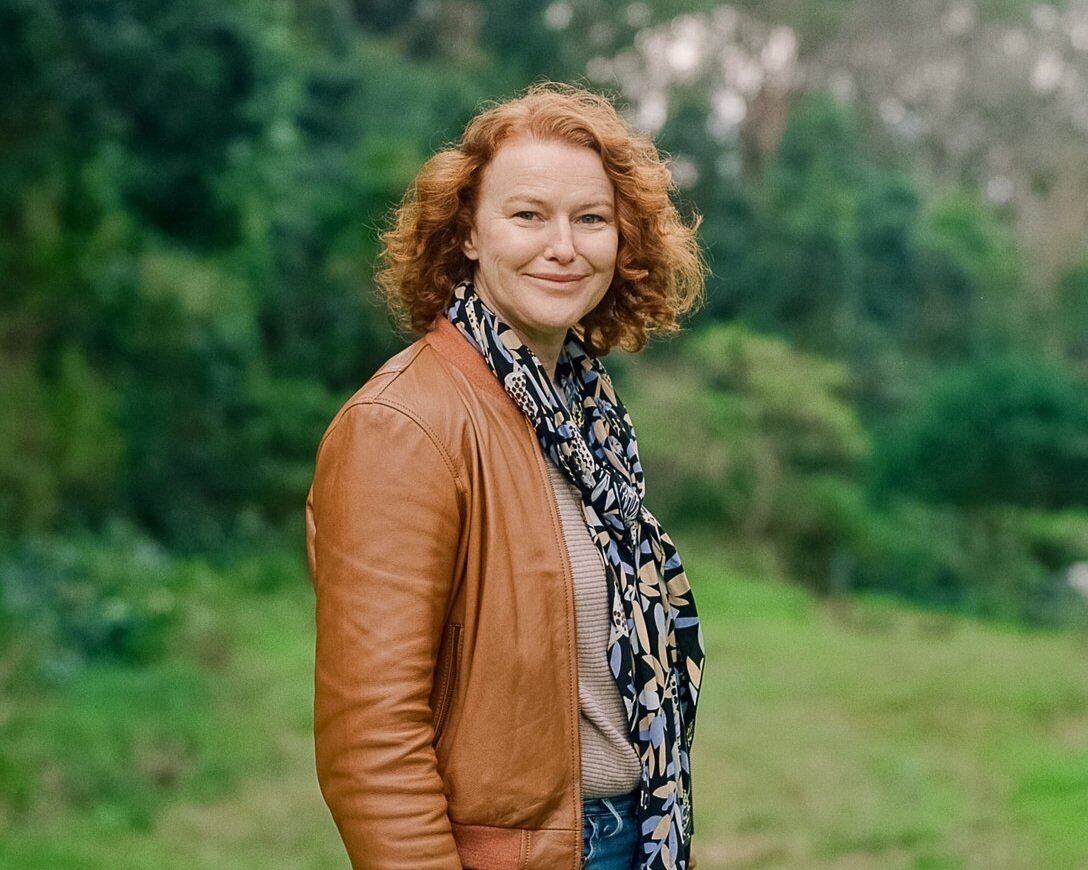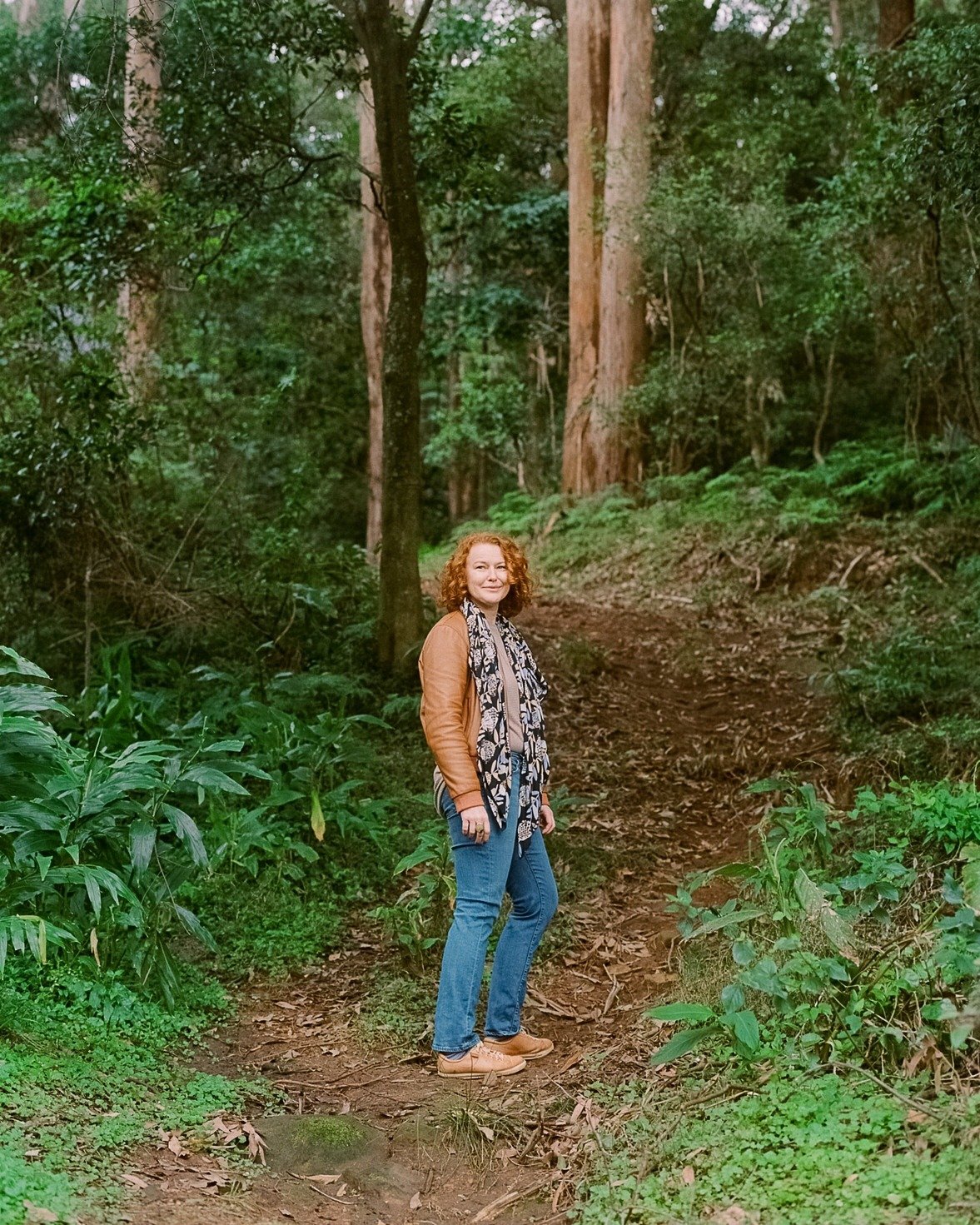Claire O'Rourke invites you to step into your power
As a climate campaigner, Claire O’Rourke understands the connection between a warming climate and extreme weather events. But when catastrophic bushfires drove her and her family from their home in early 2020, the lived reality of climate change sent her spiralling. Knowing she was not the only person feeling this way she wrote ‘Together We Can,’ a book about overcoming despair by reconnecting with your community and stepping into action, , something at the foundation of Groundswell’s Caring for Country grant.
Claire O’Rourke lives on Dharawal Country
In conversation with Jess Bineth
Photos by Nick Perritt
Photo: Nick Perritt
Can you tell me about you and where you belong?
I'm a mum of two, living down next to the beach near the forest on Dharawal Country. It’s subtropical rainforest down here, and I love being up close to the sand shifts on the beaches through the seasons, the temperature of the ocean changing. It's a magical place to live.
You've been working in the climate movement for close to a decade now. What convinced you that this book needed to be written and why now?
The bush fires in the summer of 2019 and 2020 were a pivotal moment for me. I was packing up the trailer in case we had to leave quickly and I realised that, you know, the house would probably burn down. And I had this moment where I went, this is my home, this is what we stand to lose. I'm getting quite emotional thinking about it again. We were lucky, the house was okay. But after that summer I was kind of swimming around in a mix of anxiety and grief, like I think most of the country was - we’d all suffered a massive trauma. And shortly after that I was part of this research project at The Sunrise Project, where I work, that discovered about a quarter of Australians were feeling the same thing about climate change. And so the book was a way to look at how to channel your emotions into taking action in a way that’s in line with your values.
For a lot of people, including myself, it can be really hard to engage with climate change and not feel scared to the point of overwhelm and inaction. What’s helped you move through this?
Well firstly, it's a completely normal reaction to feel overwhelmed, scared, anxious. They're normal responses to the state of the world as it is. I've had many, many moments of feeling completely overwhelmed. I used to hide those emotions, by focusing on the positives in my advocacy work. But after those fires, I started to think about my efforts and asking ‘what are they for?’ It was heavy, but I was lucky I stumbled onto the Good Grief program and I learnt how to make space for those feelings. How to hold an uncertain, dangerous future in one hand and then the potential of an exciting, reconnecting, regenerative world in the other. The other incredible thing that I discovered through writing the book was something called Acceptance and Commitment Therapy, which is all about acknowledging how you feel and then acting in line with your values rather than being stuck or reactive about the emotions themselves.
Photo: Nick Perritt
When it comes to taking action though, there’s so much you can do, so even something positive like that can leave you feeling overwhelmed. Where do you think is a good place to start?
A lot of people say, well, first you go and change your light bulbs and then you go and switch super in your bank. But it’s a never ending list and we’re all really busy and I think if we are going to focus on anything, we need to focus on systemic change. Which sounds like jargon, but it actually just means big change, the kind of change that changes whole countries. Everyone can play a role in this and in the book I try to give people some ways to figure out what their role is. It’s about looking at what you’re good at, what your strengths are, what brings you joy. And it doesn’t have to be like, writing a book. You know, my partner has been so supportive through this whole process. I've been writing this book on top of a job and we've got two kids and he says his contribution to climate work is supporting the work that I do. And that’s more than okay, the contribution you can make sometimes is supporting someone else. So yes, figure out your role. Then look at your networks and who you already know that you could join up with. Maybe they’re already involved in something. Social change spreads when people combine forces and leverage their networks. This creates momentum and has more potential for creating big, positive tipping points.
Tipping points is something you talk about a lot in the book. You say it’s time to embark on a search for signs of the positive tipping points we need to navigate through the turbulent times we’re in. What might these look like?
What I learnt about tipping points is that you can't predict them. You only really know they've happened when you see them in the rear-view mirror. But if you want to know what they look like, look for stories of scale. Actions and projects that show more people than ever are demonstrating their support for particular issues around climate change is always a good sign. So are decisions made by really big organisations that hold a lot of power in the economy all through society. Like when BHP decided to close the coal mine at Mount Arthur rather than try to sell it off. And the last federal election, where the polls showed that climate was the number one issue for millions of voters. The other thing to remember is that change is nonlinear. It will seem like nothing’s changing for an achingly long time, then all of a sudden there will be a big disruption or tipping point. And that’s because of many, many small acts taken by lots of people over a long period of time. Also systems thinkers who are working all the time on ‘changing the conditions’, so it’s easier for big changes to happen. So when you think about it this way, every action makes a difference.
Photo: Nick Perritt
Can you wind it back and tell me what the other end of a tipping point might look like? Something that shows how we as individuals can add momentum to the conditions that help deliver a tipping point.
The story in the book that I keep reflecting on is the story of the Canberra Loves 40% campaign. Phoebe Howe came home from the Copenhagen climate change talks in 2009. She’d just graduated and after that trip she thought, I want to do something about climate change. She got talking to a bunch of locals and found out the ACT government was considering its level of emissions reduction targets. Someone suggested they try to pressure the government to accept the upper end of the recommendation, and so she and some others teamed up and gave it a go. And it worked. I spoke to Simon Corbel, the Energy Minister at the time, and he said that their community campaigning helped create enough space in the political debate for him to get that legislation passed. And the design of the policy has since been replicated by Victoria, New South Wales and Queensland. So that's a tangible example of how everybody has a role to play, and that role can feel quite small and local at the time, but you never know where it will lead to - it can change the country, or maybe the world!
As we move forward and do this work, what values do we need to strengthen? And what do we need to let go of?
One of the people I interviewed in the book is Wiradjuri author and ancient society historian Nola Turner-Jensen. Her knowledge made me realise that even though I have a colonist background, the door is open for me to be as connected with Country as I want to be. I guess I needed permission, someone to say you are allowed to feel connected to Country. First Nations people are the best teachers on how to have a more integrated life with the environment. It's about knowing where you come from. It's about recognising that plants and animals are a part of our life, not this kind of separate thing to us. That idea of reciprocity, you know, when we're giving as much as we’re taking. I think that’s where we’ve gone wrong, we've just extracted from our environment and we have extracted from people with less power and that extractivism is what we most need to let go of.
Your book comes out at a particular moment in time – just after the climate election but still up against a very serious 2030 deadline. What is this moment asking of us?
This moment right now is our chance to transform this country. We have a reset moment that's come with the change of government – an opportunity for us to get bipartisan, ambitious action on climate change locked into our policy and regulatory systems and there are many options for people to participate in this new kind of political context that we're operating in. This book is an invitation to you to think about how you can be part of this moment in history and how we can make a faster and fairer transition of our entire economy and society. So we have a cleaner and healthier planet for our children, for First Nations people, for everyone.
Photo: Nick Perritt
‘Together We Can’ by Claire O’Rourke is a book about everyday Australians doing amazing things to give our planet a future. You can buy your copy here with 50% of proceeds generously being donated to Groundswell.




